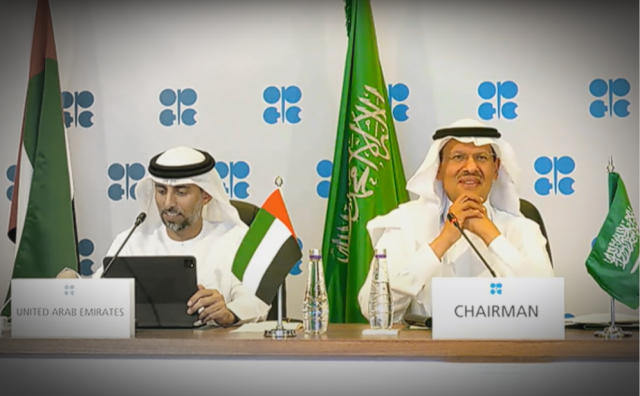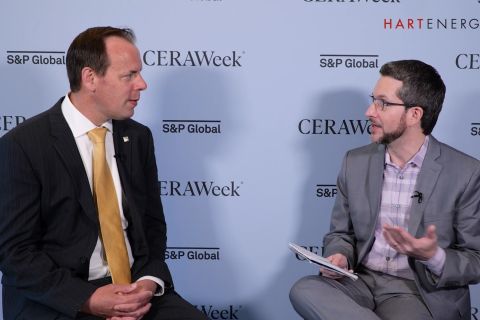
While he did not name any particular producer, Prince Abdulaziz bin Salman delivered his remarks sitting next to Suhail Al Mazrouei, energy minister of the UAE, which has been among the countries overproducing in recent months. (Source: OPEC)
Saudi Arabia has launched a rebuke against oil producers that have not fulfilled their share of supply curbs, saying moves to flout the terms of a collective deal were “damaging” for the group as a whole.
“Using tactics to overproduce and hide non-compliance have been tried many times in the past, and always end in failure. They achieve nothing and bring harm to our reputation and credibility,” said Prince Abdulaziz bin Salman, the kingdom’s energy minister.
“False promises not only discredit those who make them, but also weaken our collective goal . . . being transparent with the market and with this group about production and compliance always pay off,” he said ahead of Sept. 17’s virtual meeting of oil officials that will monitor the supply cuts agreed in April to offset a drop in energy demand due to coronavirus.
While he did not name any particular producer, Prince Abdulaziz delivered his remarks sitting next to Suhail Al Mazrouei, the minister of energy in the United Arab Emirates (UAE), which has been among the countries overproducing by hundreds of thousands of barrels in recent months.
Al Mazrouei had travelled to Riyadh for a meeting with his Saudi counterpart. Prince Abdulaziz has been infuriated by the actions of a country that has been Saudi Arabia’s traditional ally in the Gulf, according to people briefed on the matter.
“Even with our unprecedented collective efforts, any actions or statements that cast doubts about our commitment and resolve, send the wrong signal and undermine the stability of the market,” Prince Abdulaziz said.
Saudi Arabia, Russia and allied producers that make up the expanded OPEC+ group agreed in April to cut oil production by 9.7 million bbl/d from May. The cuts have since eased to 7.7 million bbl/d as part of a gradual tapering.
These reductions helped oil prices recover from below $20/bbl in April, but they have since stalled at about $40/bbl as uncertainty mounts about the demand outlook in the face of persistent coronavirus outbreaks and new measures to curb its spread.
The International Energy Agency said the UAE’s production in July was 420,000 bbl/d higher than its 2.45 million bbl/d quota. In August, the UAE’s quota increased to 2.59 million bbl/d—and output rose again, exceeding the target by 520,000 bbl/d.
Speculation has swirled in the oil market about the UAE’s motivations in producing above its quotas, when satellite technology enables tracking of oil tankers, exports and barrels in storage.
The UAE disputes the IEA’s figures. While the country has acknowledged it produced higher levels than it should have done in recent months, it has said it will compensate for these extra barrels.
Measures to curb the spread of coronavirus kept Emiratis at home during the summer months, the UAE has said, spurring far greater than anticipated electricity demand and requiring higher levels of oil production.
Saudi Arabia, the de facto head of OPEC, has pushed for overproducing countries—which also include Iraq and Nigeria—to compensate through new supply cuts.
“Repeated promises that are not carried through in a timely fashion may have temporary positive impact, but if these are not delivered, they can come back to bite us all. The market can’t be fooled continually,” Prince Abdulaziz said.
Recommended Reading
PGS, TGS Merger Clears Norwegian Authorities, UK Still Reviewing
2024-04-17 - Energy data companies PGS and TGS said their merger has received approval by Norwegian authorities and remains under review by the U.K. Competition Market Authority.
Energy Systems Group, PacificWest Solutions to Merge
2024-04-17 - Energy Systems Group and PacificWest Solutions are expanding their infrastructure and energy services offerings with the merger of the two companies.
Marketed: KJ Energy Operated Portfolio in East Texas
2024-04-16 - KJ Energy has retained TenOaks Energy Advisors for the sale of its operated portfolio located in East Texas.
Exclusive: Pat Jelinek on Decarbonization Efforts, M&A Outlook
2024-04-16 - Oil and gas leader for EY Americas Pat Jelinek discusses trends in the Lower 48 like consolidation and why decarbonization is "more important" in the near term than the energy transition, in this Hart Energy Exclusive interview.
EnQuest Selling Stake in North Sea Golden Eagle Oilfield, Sources Say
2024-04-16 - EnQuest has struggled in recent years with high debt levels and a drop in profits after Britain imposed a 35% windfall tax on North Sea producers.



